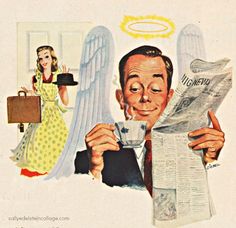A WINNER
WHO PICKED DAD – MA!
Just before the Second
World War, the agony aunt at the Daily Mirror, Dorothy Dix, imagined what would
happen if Adolf Hitler had married Mae West, and Mussolini had got hitched to
Marlene Dietrich. The conclusion common to both was that great romantic
gestures and fiery temperaments would have to yield to the daily grind if there
were to be any chance of conjugal bliss. Romance and reality did not mix and
she had a word of warning for the dictators – ‘after the rhetoric comes the
rolling pin’.
Dix was writing at a
time when her working-class readers were finding more opportunities to get a
taste of the glamorous life. Cinemas and dance halls – like the 101 on New York
Street in Leeds, where the nightly seven-piece were advertised as playing
‘sweet and hot’ – provided for the first time places that were both public and
intimate, and where courting could be done away from the family gaze.
Bright lights and
smooth talk may have turned young heads, but Dix found her postbag full of letters
from disillusioned new brides. Advising one wife of 8 months in 1939, she
suggested that the husband’s offhand manner was probably due to his having a
hard day at work. To make the marriage successful, the wife should learn to
love him with all his faults. The worst thing she could do was leave because
then she would have to support herself through work and, in a nightmarish twist, she would find that “bosses are just as irritable as husbands – so you may as
well stick to the job you have undertaken”.
 The war and direct
encounters with American culture accelerated the development of affordable
night life. But, although the war saw women occupying male positions - labouring on farms
and milling machine parts for planes and bombs - without the world coming to an
end, their status in relationships and marriage was slow to change.
The war and direct
encounters with American culture accelerated the development of affordable
night life. But, although the war saw women occupying male positions - labouring on farms
and milling machine parts for planes and bombs - without the world coming to an
end, their status in relationships and marriage was slow to change.
It could be that this
was more to do with centuries of immovable tradition than active male
oppression. Everybody knows that couples argue, but there existed an ideal of
the harmonious marriage that came about through the forbearance of each party
(but mostly the wife’s, I suspect) of the other’s foibles. It is an ideal that
was celebrated in the ancient ceremony of claiming the Dunmow Flitch. Any couple
who could swear to the satisfaction of a jury that they had not argued in one
year and a day of marriage could claim the flitch of bacon. Originally, the
couple would have to make their oath while kneeling on sharp stones set at the
doorway of the church. The award is still offered, but nowadays you can apply online and applications are open
for 2016.
By the time this
Bullet was written, a slow evolution in ideas about relationships was taking
place. Between the 1920s and the 1950s, the perceived ingredients of a good marriage shifted subtly. In her book The English in Love, Clare Langhamer
identified a change in what people were looking for by studying thousands of
‘lonely hearts’ ads in publications such as The Matrimonial Post. While in the
1920s, advertisers wanted partners who were “steady and homely”, the 1930s saw
people looking for “loyalty and affection”. By the mid-1950s, the majority were
trying to find “soulmates”.
But who is the
‘winner’ here in Dad’s effort? The most obvious interpretation would be Mum,
because she drew the prize that was Dad. But it could be read as Dad being the
winner because he was ‘picked’ by Mum.
Unusually, all the
Bullets on this scrap are written in capital letters. Some of them are marked
‘KEPT FOR OWN USE’, which implies that the others, including this one, were
written with a certain Mr C R Saville of Newport in mind. Perhaps a mix of domestic bliss and upbeat ambiguity
was the kind of thing that appealed to the agent.
Family Corner:
Any comments on this subject would be good - and remember that you can just email me if you feel anything you have to say is too personal to our family.
Family Corner:
- I know I've probably been told this before, but how did Mum and Dad meet?
- As far as any of you were aware (being children and all) what was Dad's take on the roles of men and women?
- As a general impression (though specifics would be helpful if you can remember any) do you recall Dad as angry, jokey, dull or any other overall characteristic?
- Were there lots of/very few rows?
- Were there lots of/very few signs of affection between Mum and Dad?
Any comments on this subject would be good - and remember that you can just email me if you feel anything you have to say is too personal to our family.




No comments:
Post a Comment
Hello Rabble (and others) I have changed the settings on comments so you should be able to have your say without jumping through hoops!